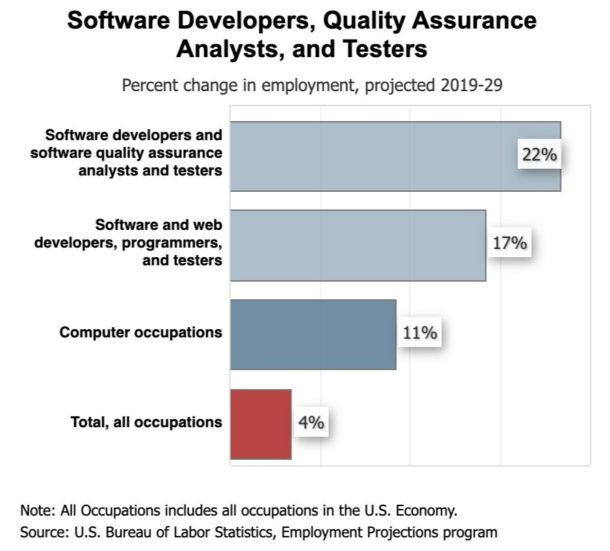How To Land A Job in Tech Without a Computer Science Degree
Perspectives from Tech Elevator Grad, Julia Engman
Software developer jobs are some of the most in-demand roles in any industry—a trend that is projected to continue.
 According to the US Bureau of Labor Statistics, “employment in computer and information technology occupations is projected to grow 11 percent from 2019 to 2029, much faster than the average for all occupations.” It’s clear that a career in coding will be future-proof for years to come.
According to the US Bureau of Labor Statistics, “employment in computer and information technology occupations is projected to grow 11 percent from 2019 to 2029, much faster than the average for all occupations.” It’s clear that a career in coding will be future-proof for years to come.
That said, there is a common misconception that to enter the field, a college degree is required. Tech Elevator grad Julia Engman did not have a traditional four-year bachelor’s degree when she decided she wanted to work in the tech industry.
“My education journey is winding. I tried a few different traditional four-year bachelor’s degree programs and they just weren’t what I was looking for. They did not fit my learning style.”

Julia completed the Tech Elevator coding bootcamp and a month after the 14-week program, she was hired as anEngineer One at Comcast, one of the top companies in the Philadelphia area. As proven by her experience, she notes: “A bachelor’s degree isn’t necessarily required to get into the industry by any means.”
Learn more about the misconception around needing a college degree, and how you can see if you have what it takes to launch your career in tech.
Entering the Tech Field: A College Degree Not Required
As many like Julia have found, a college degree is not required to learn to code and land an entry level web developer job. In fact, using data from the U.S. Bureau of Labor Statistics and PayScale, Monster placed web developer and computer programming jobs on a list of the highest paying jobs without a degree.
That said, how do you switch from your current job to one in the tech industry?
One way to enter the field quickly is through a coding bootcamp. Julia says: “Based on where I was, and how quickly I wanted to get into the industry, a coding bootcamp was the ideal solution for me.”
Coding bootcamps usually cost significantly less than a four-year computer science degree, but they vary in what you get for that price. For example, you can attend web development courses and learn html, but if your goal is to become a software developer, you’ll need to learn both frontend and backend technologies (known as full stack web development) in your foundation as a coder. If a bootcamp only focuses on one area, your job options after graduation will be limited.
Additionally, one key question to ask is how a coding bootcamp will support your career goals and help you secure your first job. At Tech Elevator, many of our students credit our Pathway Program as one of the most important aspects of the bootcamp experience. It runs parallel to the coding bootcamp and focuses on developing career readiness skills with sessions on elevator pitches, resume/interview prep, and networking; it also follows graduation with six months of career support.
According to Julia, “ [The Pathway Program’s] career sessions were extremely useful in helping me frame my experiences as something that is attractive to employers. Additionally, the mock interviews, especially the technical ones, were really good at giving me an idea of what questions to expect. Lastly, the support network after you graduate is phenomenal. You’re constantly being submitted for new opportunities by the staff, you still have your instructor and Pathway Program as a resource, and other alumni as well. They don’t drop you after you graduate, when they say they support you for 180 days after graduation, they mean it.”
Do you have what it takes? Test your aptitude!
Do you have aptitude for software/web development? A coding career can be a good fit for people who enjoy solving problems, building things, and collaborating with others. Take our free Aptitude Test to see if you have what it takes to become a web developer, no coding required.